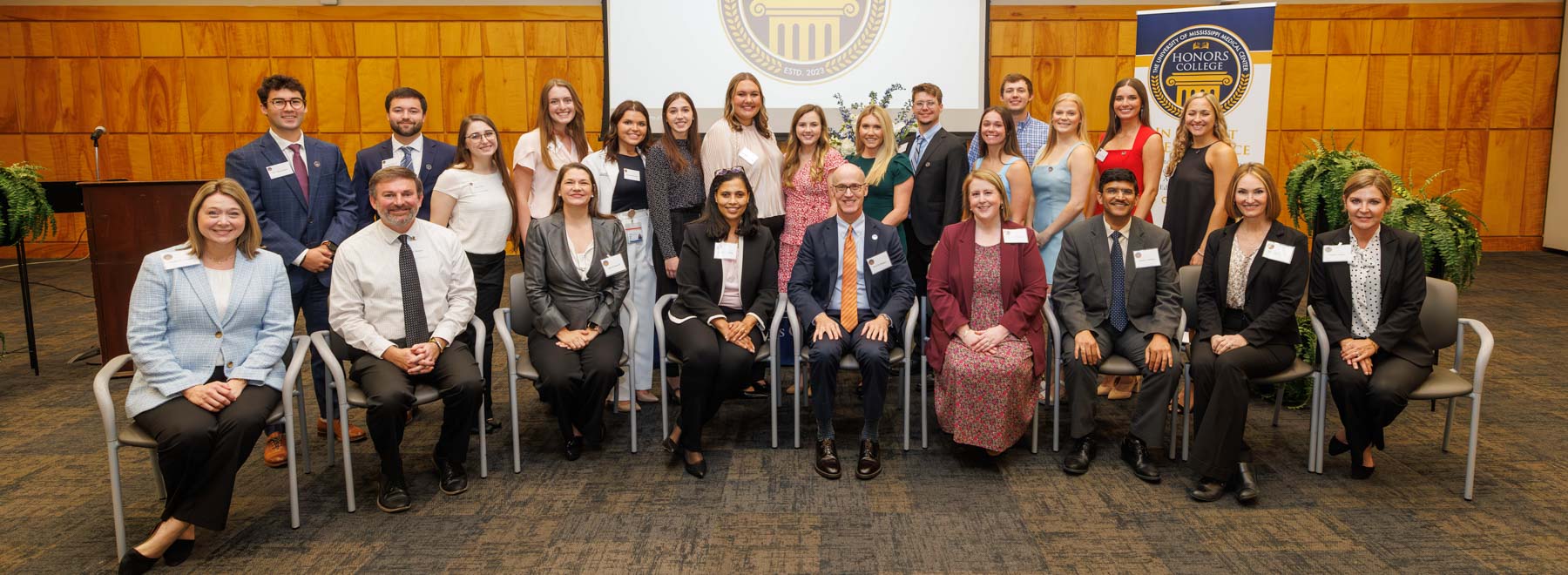UMMC’s first-ever Honors College welcomes inaugural class
Students representing the “top of the top” in their respective campus schools received their due Thursday as the inaugural inductees in the University of Mississippi Medical Center Honors College.
Led by Dr. Penni Foster, interim chief student affairs officer, the institution was created to nurture “academic distinction and educational enrichment” for high-achieving students; its official introduction last week was a history-making moment for the Medical Center.
Not only is this Honors College the first ever at UMMC, it may be the first of its kind anywhere.
“To the best of my knowledge, there’s not another one like it in the United States; I believe we’re the first to do it,” said Dr. Scott Rodgers, associate vice chancellor for academic affairs and chief academic officer.
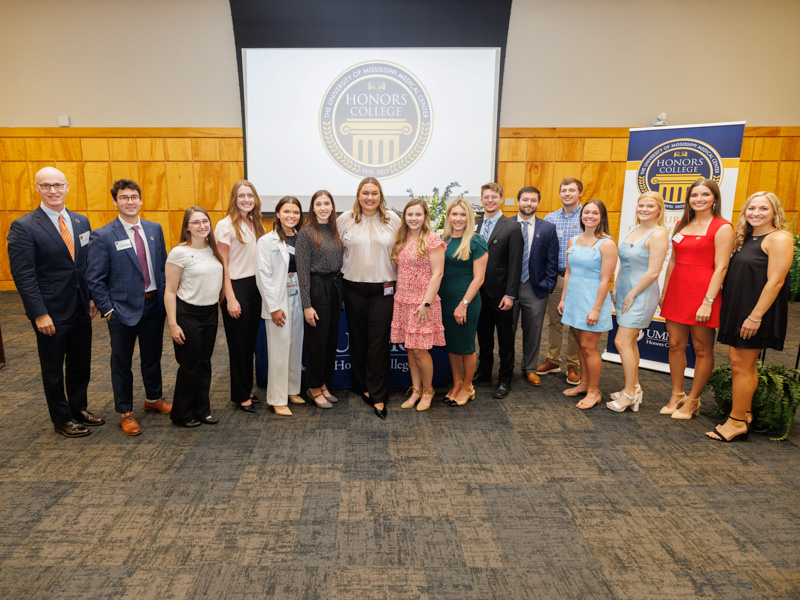
It is set apart for several reasons, he said. “It involves schools in the health professions, unlike most Honors Colleges, which are mostly undergraduate experiences. Our students arrive having already completed undergraduate coursework.”
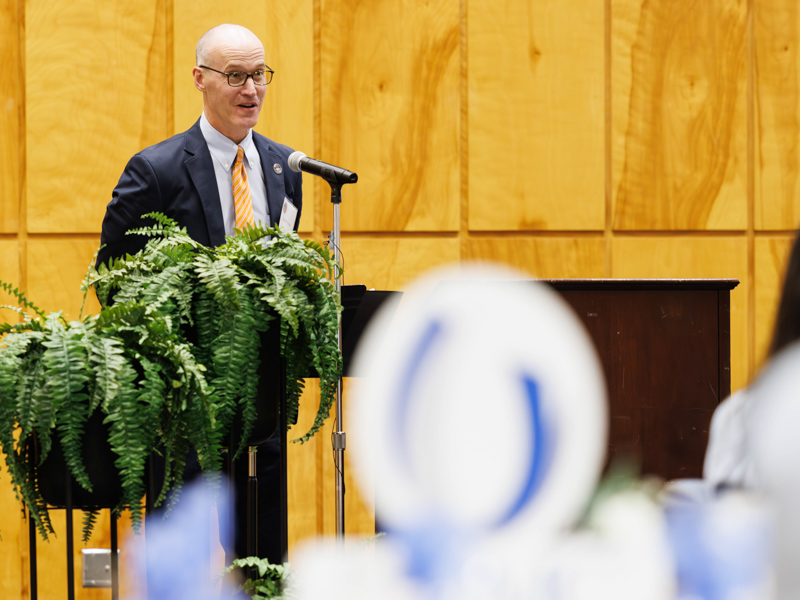
Also, it is interprofessional, he said. That is, it brings together the skills and knowledge of experts from different fields for the benefit of their patients.
Finally, Rodgers said, “UMMC has almost every major health care profession represented on its campus, while other academic medical centers tend to have fewer. When we capitalize on that uniqueness, we take full advantage of our potential to create meaningful and lasting change in how health care is taught and ultimately practiced.”
Honors College initiate Kaleb Thompson, a physical therapy student in the School of Health Related Professions, sees a “great opportunity to create relationships between students from the different schools,” he said.
“When I worked a school event with nursing school and occupational therapy students, it opened my eyes to how important interprofessionalism is to health care.
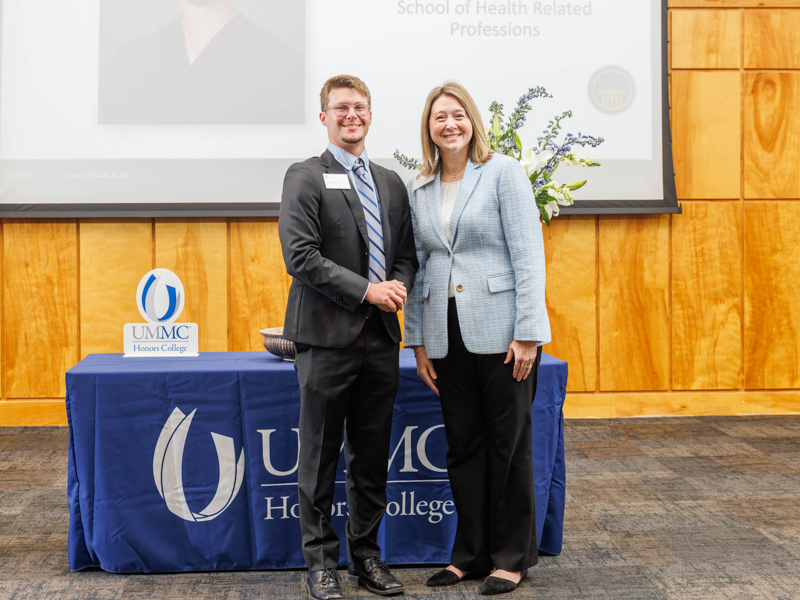
“Joining the Honors College will help make me a better physical therapist by the time I graduate, and I may even be able to work with some of these other Honors College graduates when we’re out there practicing.”
Olivia Jennings Austin was surprised to receive the Honors College invitation, she said, “because it was after a pretty rough semester for me.
“I believe it will be very helpful to me getting experience working with students from other health professions,” said Austin, who is enrolled in the School of Nursing’s Doctor of Nurse Practitioner program.
Her fellow DNP student, Sarah Davis Baker, “didn’t know what to expect when I received the invitation,” she said, “but I’m honored to be invited the first year.
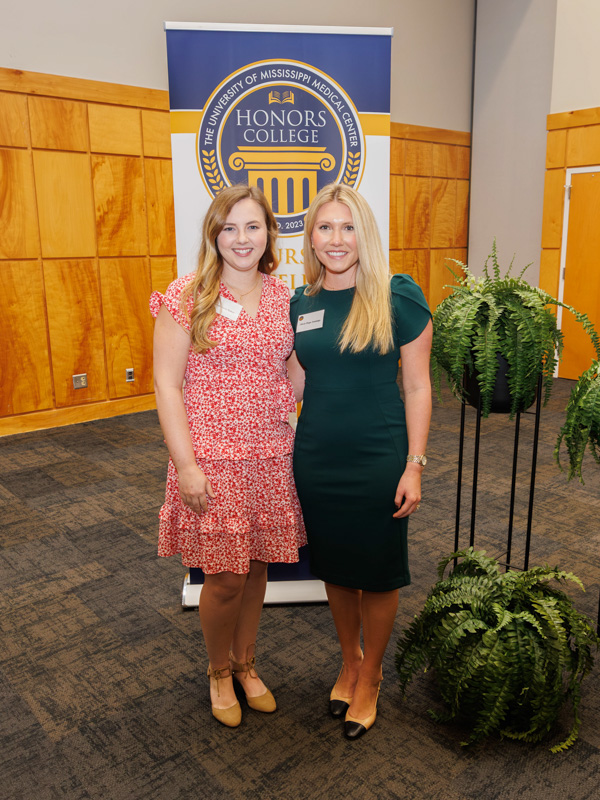
“I’m looking forward to working with other students in the Honors College.”
As it happens, only two of UMMC’s health care professions schools – nursing and health related professions – are represented in the inaugural class; that’s because of eligibility requirements.
Students are invited into the Honors College based on how well they perform in the classroom and on their professional conduct. Established in 2023 within the Office of Academic Affairs, the Honors College began the sorting-out process that year.
Students enrolled in three-year programs were evaluated for eligibility after their first year; the nineteen students inducted this go-round are all in three-year programs.
Students enrolled in four-year, or longer, programs will be evaluated after their second year. That means, next year’s invitees will also represent the schools of dentistry, medicine, graduate studies in the health sciences, population health and pharmacy, Rodgers said. “The number should expand to close to 100 next year.”
Whatever the number, students who receive Honors College pins do so not only because of what they have achieved, but also because of what they’re going to achieve in the very near future: They have some very defined work cut out for them, also known as four Pillars: Reading Room, Community Engagement, Well-being and Capstone.
The Reading Room, “the intellectual component,” highlights required reading and group discussions of the material, Rodgers said. The first book assignment: "The Immortal Life of Henrietta Lacks." It will feature such focus areas as the Asylum Hill Project, substance abuse disorders and lessons learned from the COVID-19 pandemic.
Addressing the students, Dr. Elizabeth Carr, professor and chair of dental hygiene in the School of Dentistry, said Community Engagement will “help strengthen your love of service and further develop your empathy for patients.”
Community Engagement will mean, among other things, working in the food pantry for the Myrlie Evers-Williams Institute for the Elimination of Health Disparities, said the institute’s executive director, Dr. Victoria Gholar.
“We look forward to having you in the community and getting your hands dirty,” said Gholar, assistant dean for student affairs in the John D. Bower School of Population Health. “You are the top of the top, and you will have the opportunity to grow by also impacting the lives of the underserved.”
The Well-being pillar will offer students respite and relief, said Dr. Danny Burgess, associate professor of psychiatry. “If you’re here as a student, it’s probably because you made a lot of sacrifices to achieve what you have achieved, sacrifices of time and perhaps personal relationships.
“Well-being will help you invest in yourselves.”
With sessions on stress management, nature walks and more, Well-being focuses on “the importance of taking really good care of ourselves,” said Dr. Josie Bidwell, associate professor of preventive medicine and director of the Office of Well-being, “which is really hard to do when we’re always pouring out ourselves for the sake of our patients.”
The final pillar is a Capstone project, as described by Dr. Elizabeth Hinton, associate professor and director of the Rowland Medical Library, and Dr. Amol Janorkar, professor and chair of biomedical materials science in the School of Dentistry.
The final project for each student will be a recorded presentation focused on health care issues affecting Mississippi; each will be evaluated by members of the Academy of Excellence in Education, the faculty counterpart to the Honors College.
In closing, Rodgers acknowledged the contributions of several faculty members who made the Honors College a reality, including Foster and Dr. Natalie Gaughf, assistant vice chancellor for academic affairs.
“With the Honors College, we’re going to elevate academics on this campus,” Rodgers said. “It’s not only you, the students, who have to bring energy and commitment to it, but it’s also everyone in this room – faculty, staff, everyone – who serves in some capacity in this Honors College.
“We’re going to give it the old college try.”
UMMC HONORS COLLEGE 2024-2025 INDUCTEES
Abbey Noelle McCrory, occupational therapy (OT) program, School of Health Related Professions (SHRP)
*Alexander Langhart, Doctor of Health Administration (DHA) program, SHRP
Alexandra Elizabeth Wolfe, OT program, SHRP
Crislyn E. Cole, OT program, SHRP
Daniel Ray Young III, physical therapy (PT) program, SHRP
*Hayden Cox, PT program, SHRP
Kaitlyn Mackenzie Quick, OT program, SHRP
Kaleb Joseph Thompson, PT program, SHRP
Katlyn D. Garner, PT program, SHRP
Luke McCade Alexander, PT program, SHRP
Madelaine Carol Palen, PT program, SHRP
Madison Nicole Beets, PT program, SHRP
Olivia Jennings Austin, Doctor of Nurse Practitioner (DNP), Family Nurse Practitioner (FNP) track, School of Nursing (SON)
Payton Faith Ryals, OT program, SHRP
Riley Huckaby, PT program, SHRP
Sarah Davis Baker, Bachelor of Science in Nursing-DNP, FNP track, SON
*Sarah K. Stewart, PT, SHRP
*Thomas C. Weber, PT, SHRP
Tyler Thibert, PT, SHRP
*Not present at ceremony



